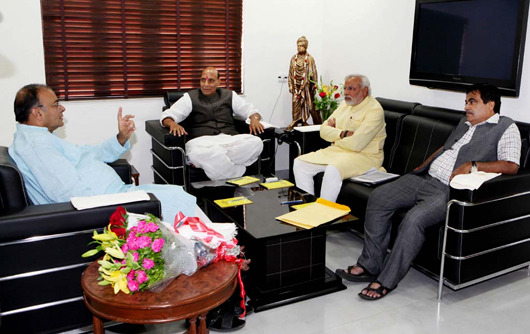
New Delhi/Ahmedabad, May 15: Ahead of counting of votes, top BJP leaders met on Wednesday in Ahmedabad to discuss future course of the party and the NDA.
In what was described as a post-poll strategy session, party top brass discussed the challenges of accommodating senior leaders in the government if the BJP gets a decisive mandate and forging an alliance outside the NDA fold in case it falls short of a majority.
It is learnt that the leaders talked about the idea of offering the post of Speaker to Murli Manohar Joshi and NDA chairperson to L K Advani respectively. A final call would be taken after holding talks with them.
As the exit polls and the party’s internal survey have predicted that the NDA will reach the half-way mark comfortably, the party core team is believed to have discussed the fate of senior leaders L K Advani and Joshi since they would not like to work under Narendra Modi.
“As far as the roles of veteran leaders are concerned, I will call a meeting to which they will be invited. After thorough discussions with all top leaders, we will decide what role will be played by which person,” BJP president Rajnath Singh told reporters at Ahmedabad airport.
Singh, former party chief Nitin Gadkari and senior leader Arun Jaitley flew down to Ahmedabad on Modi’s request as the Gujarat chief minister was burdened with pending files because of his preoccupation with election campaigning across the country.
The BJP parliamentary board will meet in Delhi on May 17 to finalise a timeframe for electing Modi as leader of the BJP and the NDA.
“I have told Narendrabhai to come to Delhi on 17th. I will convene the Parliamentary Board meeting on that date to decide the earliest date to hold BJP parliamentary party meet to formally elect Narendrabhai as our leader,” BJP chief Rajnath Singh told reporters in Ahmedabad on Wednesday night. The meeting of the BJP’s highest decision-making forum will also decide what role party senior leaders will play in the next government, Rajnath said. He denied there was any rift between BJP leaders on the issue.
Replying to a question, he said the issue of Gujarat chief ministership will also be decided at the meeting. A couple of RSS functionaries will assemble in New Delhi on Thursday to keep a close watch on the poll outcome.
Party sources said talks between the leaders in Ahmedabad, that lasted for more than three hours, are learnt to have centred around two broad possibilities. They discussed what should be the party strategy if the BJP-led NDA gets more than the required 272 seats. And also if the NDA will have to look for allies in case it falls short of the magic 272 mark.
The top brass had already shared the agenda of Wednesday’s meeting with Advani and Sushma Swaraj, given their reservations over Modi’s projection, before flying off to Ahmedabad. Singh and Gadkari visited Swaraj at her residence in the national capital earlier in the day to gauge her mood on government formation and her role, leading to speculation that she was not happy.
Sushma, however, later denied in Bhopal that she was unhappy. The BJP has decided to keep the big four ministries–finance, defence, home and external affairs–in case of a thumping mandate and will share important portfolios with NDA partners.





Comments
Add new comment